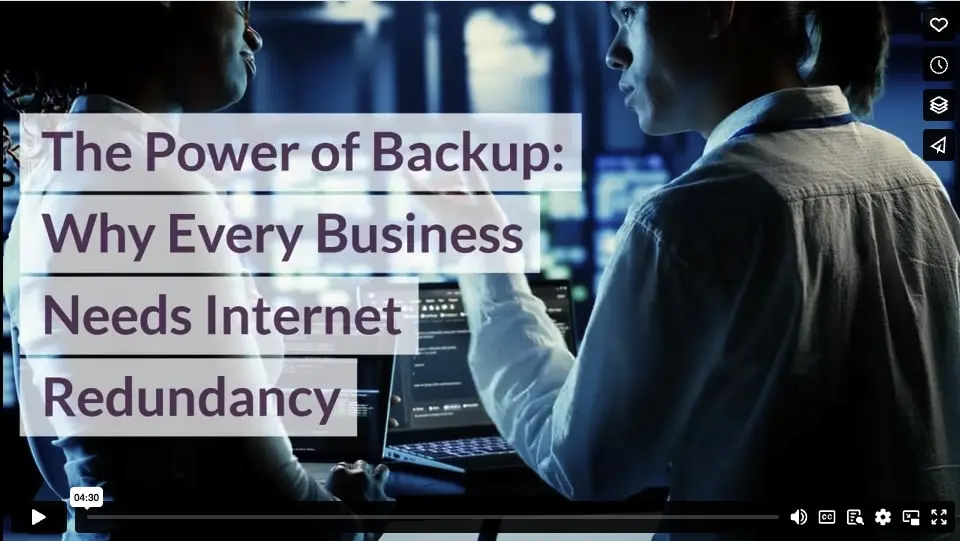When you lose your internet, it’s like your business hits a wall.
With many businesses doing the bulk of their work in the cloud, a lost connection means works stops.
Internally, your team’s workflow grinds to a halt. They rely on a suite of online services—email, Slack, cloud storage, web access, and VoIP systems—that become inaccessible.
So, for any business, big or small, having a backup plan for internet outages is key. That’s where internet redundancy comes in.
What is internet redundancy?
Internet redundancy involves setting up additional internet connections to ensure your business stays online, even if the primary connection fails.
Say your business connects to the internet through a cable. If this cable gets cut, you’d normally lose your internet. But with redundancy, you have another connection waiting, like a wireless one, to keep you online.
Choosing a backup that’s just as fast and reliable as your main connection is key. This setup ensures a smooth and uninterrupted transition. It allows your business operations to continue without any disruption.
What are the Benefits of Redundant Connections?
Having redundant internet connections brings several advantages for businesses relying heavily on online operations.
- Flexibility and Growth: First, these connections let your business change easily. You can add more or use less internet as needed. This helps your business grow without internet problems.
- Uninterrupted Operation: Then, having more than one way to connect to the internet means work doesn’t stop. If one connection fails, the other keeps you online. For example, if a main cable breaks, a backup like 4G or 5G takes over.
- Better Speed and Use: You can combine different internet services for better speed and handling of your online needs. For example, using Comcast with FIOS creates a bigger, faster internet connection for your business.
- Always On: At the heart of it, having backups means you can always rely on your internet. This is crucial if you use the internet to store files, talk to clients, or run your business. Your internet is always there, keeping everything running smoothly.
What Are the Essentials in a Redundant Network?
For a solid redundant network, you’ll first need a secondary internet service provider. Ideally, this one should be different from your primary provider to reduce the chance of both networks experiencing outages simultaneously.
Next, the right equipment is essential. Your router must be capable of automatically switching between these providers. Consult with your IT managed service provider (MSP) to ensure your system can handle this without any manual intervention.
A great choice for redundancy is fixed wireless internet. It beams a broadband connection to your business through the air rather than relying on the physical cables used by traditional internet services. This difference significantly lowers the risk of simultaneous outages with your primary cable internet.
Moreover, fixed wireless comes with its own set of advantages. It’s less vulnerable to the environmental factors that can affect satellite internet, and it is not susceptible to the physical damage risks of cable internet. Whether as your main or backup connection, it offers reliability.
Pro tip: Using structured cabling with your fixed wireless can make your network even stronger. It gives you a solid, flexible setup that’s ready for whatever comes your way.
How Much Does a Redundant Service Cost?
Your backup system shouldn’t exceed the cost of your primary one. However, telecom companies often complicate internet service purchases by concealing the true costs. This includes additional time, fees, and doubled costs when purchasing backup connections from ISPs.
Telecoms treat internet service as a commodity but extend buying cycles to charge based on customer insights. This often results in varying quotes even for identical needs in the same location. Researching your options is essential.
By thoroughly understanding your internet backup options, you can avoid overpaying for services and mitigate unnecessary expenses.
Working With an IT MSP to Achieve Internet Redundancy
When considering methods to improve your internet reliability, collaborating with an IT MSP can prove highly advantageous.
An IT MSP possesses the necessary knowledge and expertise to assess your current network infrastructure thoroughly. This includes identifying weaknesses, proposing effective solutions, and optimizing your network setup accordingly.
They can aid in selecting dependable internet service providers and negotiating favorable terms for redundancy. They also manage the technical aspects of implementing redundant connections to ensure there are no disruptions.
IT MSPs assist in developing broader disaster recovery and business continuity plans. This ensures your data is always backed up, your systems remain redundant, and you have quick failover capabilities to keep your business operational, no matter what challenges arise.
Video
Infographic
Losing your internet can halt your business operations, especially if your work relies on the cloud. Having a backup plan for internet outages is crucial for any business, big or small. Read on to learn more about internet redundancy in this infographic.





